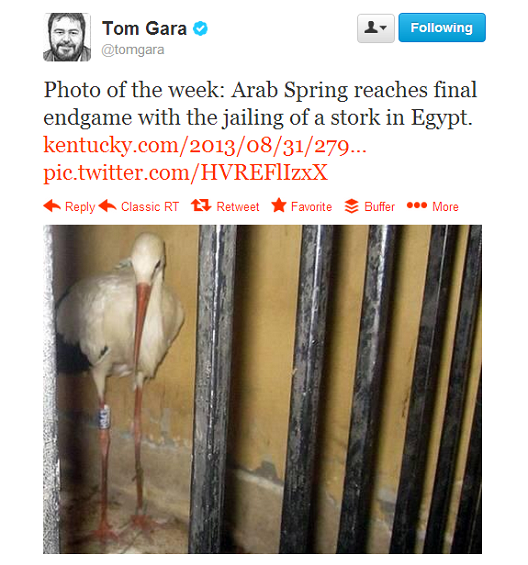Catch up on the latest out of Egypt every week, with analysis, news updates, photos, videos, and more.
“They’re not showing their faces, but just because you turn the volume off on a radio it doesn’t mean that the tune stops playing.”– Aalam Wassef on the Third Square protests against both the Muslim Brotherhood and the military.
- Judicial advisory body recommends dissolution of Egypt’s Brotherhood
- Egypt’s ousted president Morsi referred to criminal court over December 2012 violence
- Egypt names key constitution panel with few Islamists
- Police state not coming back, says Egypt’s interim president
- Nour Party to participate in Constituent Assembly
- Two months after Morsi’s ouster, thousands protest across Egypt; resumption of railway services postponed
- Government committee tasked with implementing ‘Path to Democracy’ program
- Ministry of Endowment closes 2,200 mosques in Fayoum
- Bomb explodes near Egypt interior minister’s convoy
- ‘No decision’ in Egypt on dissolving Muslim Brotherhood
- In South Egypt, Islamists take over a town
- One civilian dead, one detained, after assassination attempt on interior minister
In my Cairo neighborhood, new violence but the same old troubles | Mokhtar Awad, The Washington Post
Highlighting the relatively drab history of Nasr City,Mokhtar Awad, recollects his childhood memories of both the Raba’a al-Adaweya mosque and the hospital he used to go to, as well as his years growing up on the surrounding streets.
“There is nothing special about Nasr City, the eastern Cairo neighborhood where Raba’a stands. It has no culture and little history save for the spot where President Anwar Sadat was assassinated in 1981, yards from where supporters of deposed President Mohamed Morsi recently held their sit-in.”
“I remember a young revolutionary telling his mother, “We sacrificed in order to give you the vote, and now you choose to kill us with this vote.” Now that mother stands with a large swath of Egyptians supporting General Abdel Fattah al-Sisi and his campaign against the Muslim Brotherhood.”
“The uprising that aimed to rid the country of its demons has yielded a status quo that may put Egypt on a more dangerous path than ever. The dream of a better future that mobilized the young revolutionaries two and a half years ago remains elusive; it has been manipulated and exploited by the Islamists and the military establishment alike.”
“The charred and haunting facade of the Rabaa mosque still stands. It will be rebuilt. But it will be up to Egyptians to either learn a lesson from the military brutality that took place there or look nearby at the Islamists’ brutality that assassinated Sadat and paved the way for Mubarak. The only real hope for a brighter future, however, is to learn from both — and move beyond them.”
A people’s history of the Egyptian revolution, Parts One, Two, and Three | Hani Shukrallah, Ahram Online
Hani Shukrallah, begins a series documenting the history of the revolution from the people’s perspective. Three parts have been published and it is yet to be continued.
From part 1:
“There is glory in millions of people throwing off the shackles of fear and submission, transforming themselves into subjects of history rather than its hapless victims; there is glory (and a great deal of poetry) in the heroism, courage and sheer determination of the young people who launched the Egyptian revolution and kept its spirit alive for the past 30 months, against seemingly insurmountable odds, and at great cost.”
“Yet, the eighteen days were as glorious as the long months of resistance that followed them, against the military allied to the Muslim Brotherhood, against the military in conflict with the Muslim Brotherhood, and against the Brotherhood’s frenzied grab of Mubarak’s authoritarian state – and no less messy.”
Activists launched a campaign called “Masmou3,” meaning “Heard,” calling for people to bang on pots out their balconies and windows at 9 p.m. every night. The movement is promoting the unheard voice of Egyptians who reject both rule by the military and the Muslim Brotherhood. Maintaining the motto that was defined the January 25 revolution they continue to call for “Bread, Freedom, and Social Justice.”
Image of the Week
Source: Youm7
Translation: Al Jazeera Egypt | Pointing to the banana, the screen reads “Apple.”


